Manhunt Underway To Detain Driver Who Ran Over Cleric In Iran
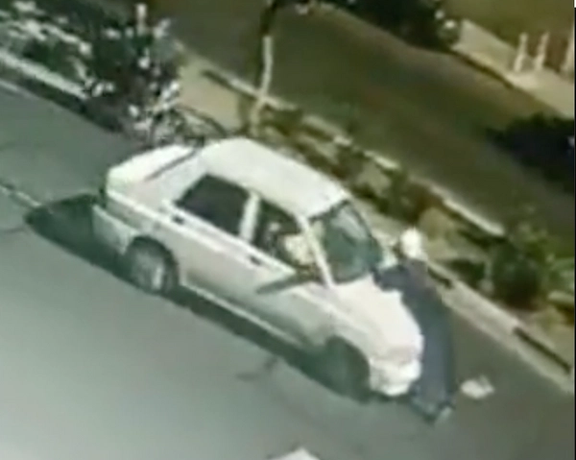
A manhunt by police to find the culprit in the attempted murder of a cleric in Tehran is underway.

A manhunt by police to find the culprit in the attempted murder of a cleric in Tehran is underway.
After parking his car in Marzdaran Boulevard in Tehran at 9 am on Wednesday, the 35-year-old cleric was the victim of a ramming, police said in a statement.
The culprit fled the scene and the cleric's health state has not been disclosed.
As another sign of rising anger against clerics, a bank guard shot and killed a senior cleric in northern Iran on Wednesday, according to CCTV footage.
Abbas-Ali Soleimani was the most senior clergyman killed in months of unrest that has rocked the country since the death in custody of Mahsa Amini.
State television reported that a man overpowered a guard and shot the cleric, but authorities did not provide a motive for the attack.
In later surveillance footage shared widely by Iranian media, the shooter was seen entering the bank carrying a firearm, milling around briefly, and then shooting Soleimani.
In response to the murder, the Interior Ministry announced that a special investigation will be launched.
Protesters have been targeting clerics in Iran's latest protests. Since the 1979 revolution, the clergy have gained increasing power in Iran, but discontent has risen in recent years, particularly amid waves of protests over economic, political, and civil rights issues.

Iran’s foreign ministry has denied a report by The Wall Street Journal that Tehran has been shipping artillery shells and other ammunition to Russia.
Spokesman of the ministry Naser Kanaani on Wednesday said, Iran is opposed to war and supports a ceasefire and peace in Ukraine.”
WSJ reported that Iran has shipped over 300,000 artillery shells and about a million rounds of ammunition to Russia using cargo ships in the Caspian Sea.
The report published on Monday stated that the weapons were delivered over the past six months, and then sent to the frontlines in Ukraine.
Officials in the Middle East have told the WSJ that the last shipment of weapons to Russia crossed the Caspian Sea aboard the 460-foot Russian cargo ship Rasul Gamzatov in early March. The company owning the vessel has already been sanctioned by the US.
US State Department spokesperson said Monday, “This is – the Russian Federation’s deepening of relations with the Iranian regime also continues to be something that is deeply concerning to us and something that we are continuing to pay close attention to. “
Last summer, Russia turned to Iran for help. Iran initially provided hundreds of kamikaze drones and agreed to provide more than 300,000 artillery shells.
Iran first denied it had supplied drones to Russia but in early November foreign minister Hossein Amir-Abdollahian admitted the deliveries, but claimed they were sent before the Russian invasion.
Several months ago, the United States and other allies of Ukraine said Tehran was ready to send ballistic missiles to Moscow. However, experts say this has not happened yet.
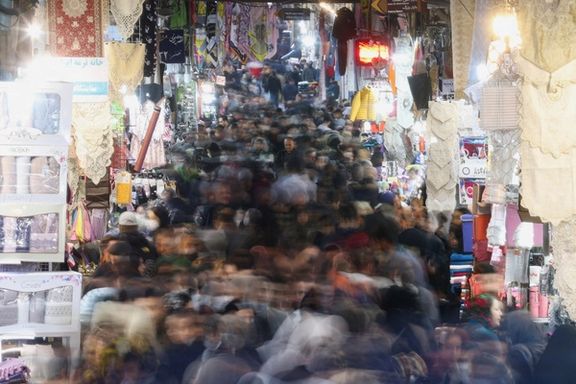
A television debate on liberal and state-control economic principles captivated audiences in Iran this week, as the country looks for solutions to its crisis.
Two university professors, one an ideological proponent of state-controlled “Islamic economy”, and the other, an avid proponent of liberal economic theories, clashed on national TV, often turning the debate into personal attacks.
Masoud Derakhshan, an economist trained in Britain but an Islamist and a leftist by conviction, who believes there needs to be just one “national bank” in the country running all commercial, private and government banking needs. As an Islamic principle, he strongly objects to “usury” and believes all banks end up charging interest, which is forbidden in Sharia.
Except the issue of usury, it is not clear what “Islamic economy” means.
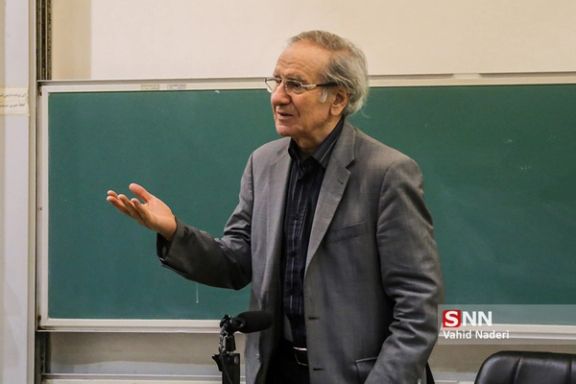
His opponent Mousa Ghaninejad, a professor of economics says, “There is no such thing as Islamic economy,” and believes in the Austrian school of liberal economic theory, personified by the preeminent 20th century philosopher, political scientist, and economic theoretician Friedrich August Hayek (1899-1992).
Ghaninejad argued during the debate that leftist revolutionaries poisoned the new constitution with their economic ideas after the 1979 revolution. Arguing that Iran faces a serious crisis, he insisted that overwhelming government control established since the 1980s turned into a corrupt system of nepotism.
“Islamic Republic’s development model was based on an anti-capitalist theory, while Islam defends private property,” he argued, adding, “Our misfortune was national socialists.”
Derakhshan in a typical mid-20th century leftist manner responded that “Ghaninejad is distorting the Constitution and the Islamic revolution. The theoreticians of liberalism are defending certain ideas to protect the interests of capitalists.”
At this point, Ghaninejad produced three books during the show, published in the early days of the revolution by the Communist Tudeh Party of Iran, to prove that leftists influenced the Islamic Constitution in its economic precepts. He also argued that President Abolhassan Banisadr, whom he described as a leftist, and the ideas of Islamist-Marxist Ali Shriati had a profound impact on the Constitution.
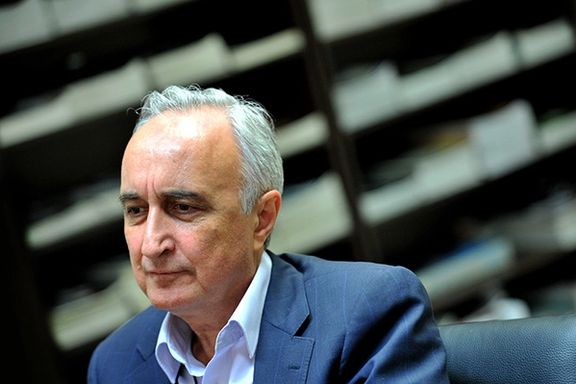
He went on to say that Liberals are all for competition – something that has been completely stifled in Iran – and as a matter of fact, he argued that as a capitalist gets much richer, he also opposes competition, because he wants to dominate the market.
“Our economy is a politicized economy of nepotism,”Ghaninejad stated, referring to politicians and factions presiding over the government that controls 80-percent of the economy and distributes monopolies and quasi-governmental companies between friends and family. These companies lose a lot of money, but the government-appointed managers get rich.
There is also the phenomenon of shady privatization when government assets I sold at a fraction of their real price to well-connected people.
The Islamist Derakhshan passionately argued that there is no self-sustaining free market, and this is purely a deception. Iran’s economy must be an Islamic economy he insisted, while not responding to his opponents argument that private property and commerce are protected rights in Islam.
Ghaninejad, in an apparent attempt to be politically correct, said he acknowledges that the United States is a dominance seeking power and inflicted huge pain and suffering on Vietnam, much greater than anything it has done to Iran, but today, the US and Vietnam have amicable relations. However, “We unnecessarily dug a hole for ourselves at the beginning of the revolution when leftist Islamists occupied the American embassy.”
Condemning the US sanctions against Iran, the liberal economist said, “To the extent that America’s economy is based on competition I am an advocate of it, but when capitalism becomes political, I oppose it, because it violates liberalism.”
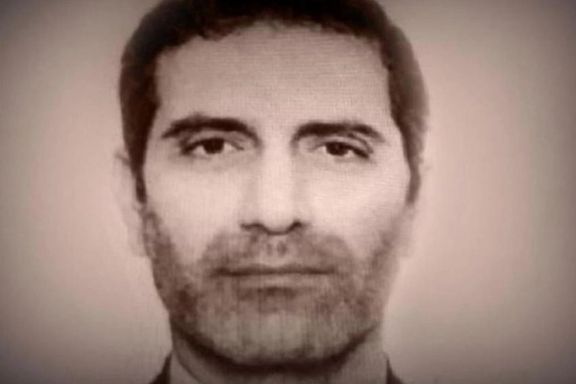
Belgium denied Iranian claims of a prisoner swap between the two nations on Wednesday.
"Belgium has requested an exchange and so have we for our diplomat Asadollah Assadi. Following the necessary protocols, such an exchange will be done soon," Iranian judiciary spokesperson Masoud Setayeshi said on Wednesday.
But a spokesperson for Belgian Justice minister Vincent Van Quickenborne denied a deal had been reached.
"This is a false message from a rogue state that specialises in making false statements", Van Quickenborne said to Belgian public broadcaster VTM.
"They do this to manipulate and confuse an innocent compatriot and his family.”
In March, Belgium's Constitutional Court upheld a prisoner exchange treaty with Iran that could lead to Iranian Asadollah Assadi being swapped for jailed Belgian aid worker Olivier Vandecasteele.
Asadollah Asadi, 51, a former attaché at the Iranian embassy in Austria, is serving a 20-year sentence in Belgium for “attempted murder and involvement in terrorism” for his role in plotting to bomb a gathering of the exiled opposition group Mujahedin-e Khalq Organization (MEK) near Paris in 2018.
Iran’s security forces have detained Olivier Vandecasteele, 41, an aid worker who has served in various international humanitarian organizations since at least 2006.
An Iranian court sentenced the humanitarian worker to 40 years in prison and 74 lashes, it was announced in January.
He has been subject to torture, according to Amnesty International, and is being held in solitary confinement in a windowless basement cell without access to adequate healthcare and fresh air.
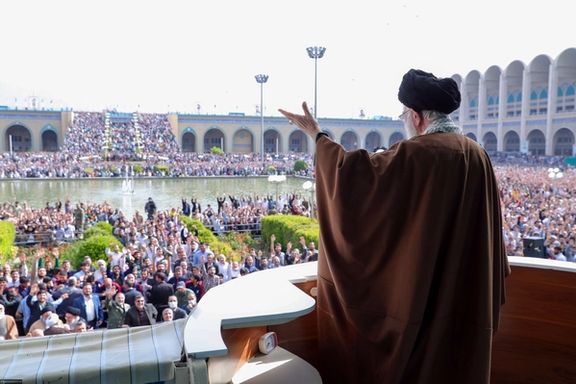
Following Supreme Leader Ali Khamenei’s strong rejection of a possible referendum, the administration’s newspaper has warned of the perils of a plebiscite in Iran.
The government’s official daily, Iran, published a commentary about the calls for a referendum, insisting that "issues related to national security can be very sensitive, and depending on the specific circumstances of each country, holding referendums on these issues may lead to unpredictable and dangerous results."
Nationwide anti-regime protests since September and the resulting instability raised the issue of a referendum on the constitution, with the unspoken intent of limiting the powers of the Supreme Leader.
Amid the hijab controversy and hot debates among politicians, calls for putting contentious issues to a popular vote have been increasing in recent weeks, but the authorities are worried that the seemingly innocent and legal demand will further reveal the tyrannical nature of the regime, especially after pro-regime students recently confronted Supreme Leader Khamenei about it.
“No political system exposes its existence to re-voting,” read the article, adding, “this is basically a strange and unconventional issue that is proposed by some. Therefore, to expect the Islamic Republic to hold a referendum on its own existence and to ask the Iranian people about its continuation is a wrong and logically baseless issue.”
The paper claims that “the main adverse consequence of the referendum is the loss of public trust... because it may lead to unjust justification of decisions.” Among other negative consequences is “an aggravation of social divide... if the result of the referendum is not accepted by some groups for various reasons.” It can even “pave the way for rioters to enter the armed phase against the political system,” the article claimed.
The article also claimed that a referendum can have a negative impact on the country’s foreign relations and justify further international pressures against the regime. Another negative impact can be on the economy because a referendum implies “the instability of the political situation.”
Almost all the points that the article enumerated prove that the government newspaper already knows what the result of such a referendum would be.
The daily added that if the system is acceptable enough that the people trust it for holding a referendum, it means the legitimacy of the political system is recognized.
However, almost all dissident figures have called on international bodies to oversee a possible referendum because the regime has proven time and again that it cannot be trusted with the people’s vote as was the case in the 2009 presidential election, which led to about two years of regular anti-government protests.
Former regime insider and current opposition figure Mir-Hossein Mousavi, who was a presidential candidate in 2009 and has been under house arrest since 2011, as well as former president Hassan Rouhani and several others have called for a plebiscite over key issues, such as a new constitution, or the nuclear program.
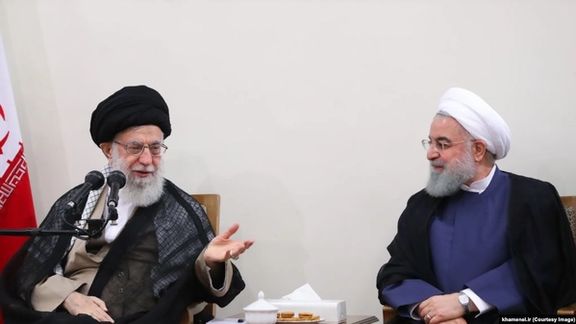
At a meeting with the senior officials of his government, former lawmakers, journalists and politicians on April 5, Rouhani reiterated that the answer to people’s demands could be holding referendums as envisaged by the Constitution of the Islamic Republic.
Article 59 of the Constitution of the Islamic Republic, which was ironically approved by a referendum after the Islamic Revolution of 1979, stipulates that in extremely important economic, political, social, and cultural matters, the functions of the legislature may be exercised through direct recourse to popular vote by holding a national referendum. It must be approved by two-thirds of the members of parliament according to the Constitution.
Over 400 Iranian civil and political activists also issued a statement mid-April saying the only "violence-free and democratic" solution for transition from the Islamic Republic is holding a democratic referendum. The signatories, including many former officials of the regime, noted that the most important lesson of the "Woman, Life, Freedom" movement is the necessity of "organized efforts to demand justice, as well as the abolition of intimidation, privilege and discrimination."
A few days later, Iran’s ruler, Khamenei, dismissed the possibility of a referendum, saying that people are not capable of making decisions. During a meeting with a cherrypicked number of students on Tuesday, Khamenei questioned the viability of a referendum. He said: “Is it possible to hold a referendum on various issues in the country? Where in the world do they do this? Do all the people who have to participate in the referendum have the ability to analyze that issue?”
A video clip of a Basij student “confronting” Khamenei during his speech went viral, perhaps indicating that even some loyalists are discontented with the regime’s performance.
The article claimed that “There must be a popular consensus about holding a referendum. It must be proven that at least over 50 percent of the people demand a referendum on a specific issue.”
It did not elaborate on how people can make the regime hear their demand if there is no chance for a plebiscite.
The daily claimed, in familiar rhetoric, that “the foreign media have construed from Khamenei’s words that the Supreme Leader is against the referendum, and worse, that he is against the opinion of the people and does not consider them worthy to express an opinion. However, it must be said that Ayatollah Khamenei's answer is not related to the principle and philosophy of the referendum; rather, it is a management reminder.”
Khamenei’s rhetoric of comparing his regime with other countries is misleading because he and his loyalists have severely restricted most freedoms and manipulated elections, jailed opponents and critics and jailed or killed protesters.
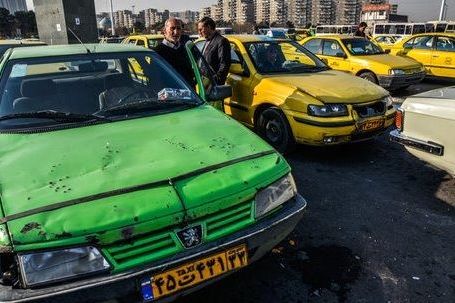
An Iranian official says scrapping worn-out cars can save Iran at least 33 million liters of gasoline (8.7 million gallons) a day.
The chairman of the Association of Car Scrapping Centers said Tuesday that currently 14 to 15 million junk vehicles are on the roads, all consuming massive amounts of gasoline.
Consequently, Mohammad Mashhadi Sharif predicted that Iran's gasoline consumption will increase by 33% in the next 4 years.
Of these sub-par vehicles, there are about 3 to 3.5 million passenger cars, 500,000 public transportation vehicles, 10 to 11 million motorcycles, and 200 to 300 thousand worn-out trucks in the country.
Iran is awash with old cars, not least, due to the difficulty of importing newer models which are restricted and heavily taxed. The government has placed massive tariffs on imported vehicles --from 55 percent of their price to 95 percent depending on the capacity of their engines, making it even more expensive to buy good cars.
Iran’s government has a monopoly on car manufacturing which has led to high prices and a lack of innovation. However, the government has been unable to keep up with demand and as a result, there is a long waiting list for new vehicles, Iranians preferring second-hand options, which are also often far from meeting minimum safety standards.
Tweet unavailable